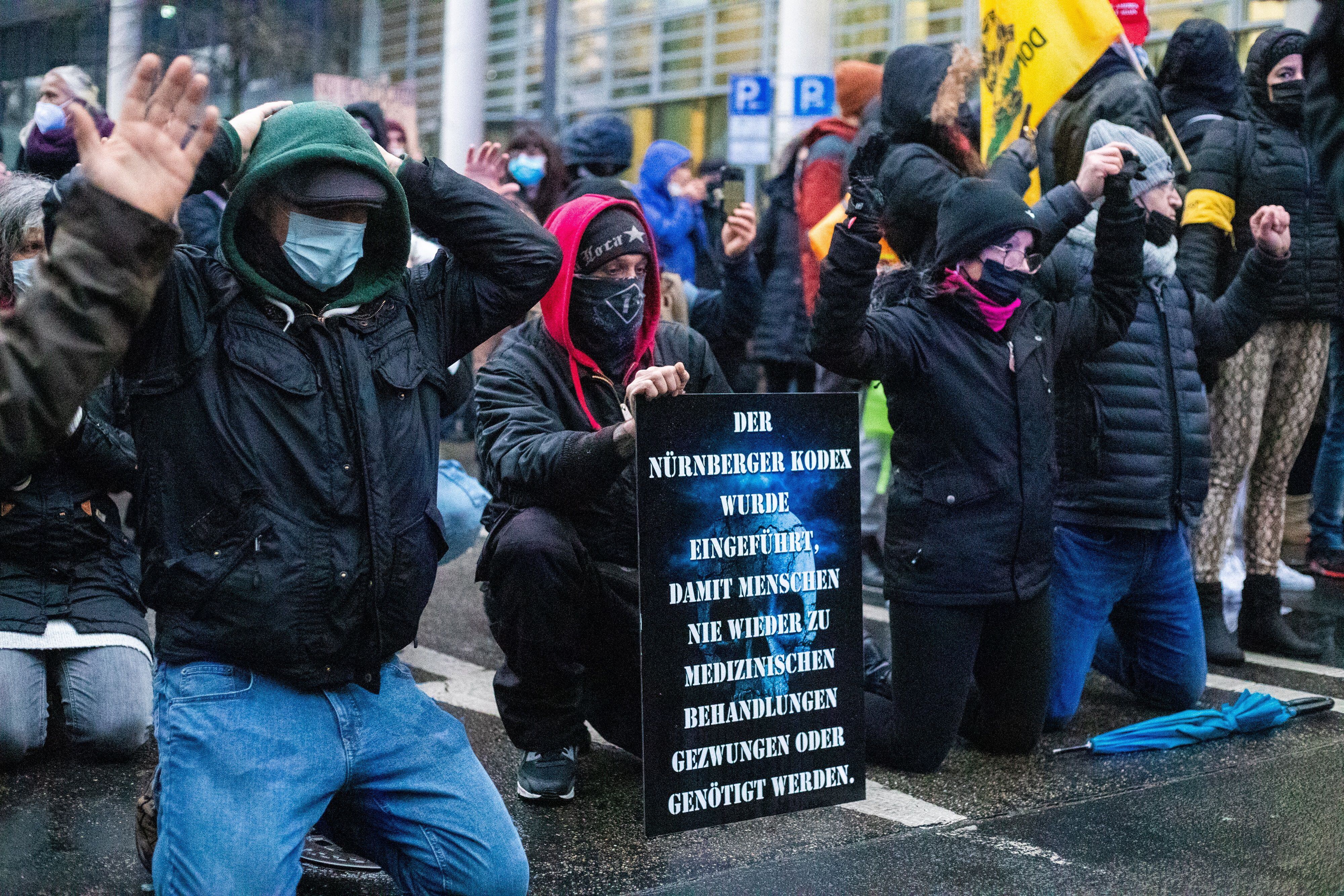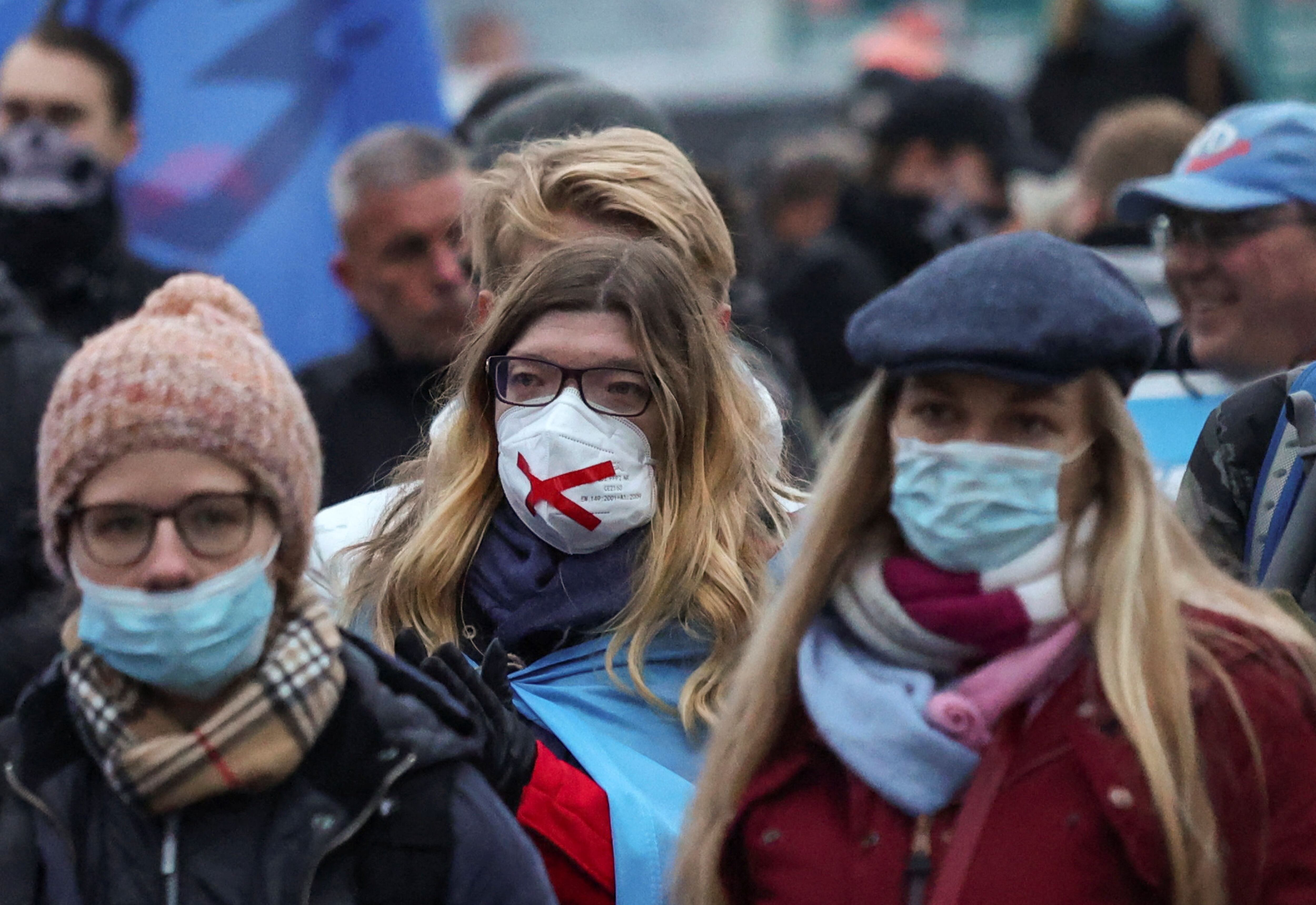For some the vaccines were developed in a suspicious record time and they do not trust them; for others, they are not necessary because the body is in charge of fighting disease; but for the most radical, they are simply an instrument of control. In this mix, the movements antivacunas -which were previously marginal- have been reinforced by the pandemic of the COVID-19 and most of all, with the restrictions that have come with it.
If there is a country where this movement has stopped being an annoying noise to become a real concern, that is Germany. And not just a health concern, but for safety.wwAnti-vaccines vandalize Mont Valérien, a place of homage to those who died during World War II
The anti-vaccines went dangerously from words to action, after it was discovered that a group of them were planning, in a Telegram chat, the murder of Michael Kretschmer, the prime minister of the state of Saxony, the ‘land’ with the lowest vaccination rate in the country. This Wednesday, the Saxon police seized weapons, including crossbows, in the homes of six people in Dresden who were planning the attack.
The alleged plans of the group were revealed on December 8 thanks to a report by the public channel ZDF, which had access to the voice messages of about 120 members of the chat, in which the suspects claimed to possess firearms and to be willing to to “sacrifice” to achieve their goals.
- Facebook dismantles a mass harassment network linked to anti-vaccines that attacked journalists, doctors and politicians
- Germany approves mandatory vaccination for healthcare workers
“What currently exists in Germany is the denial of reality, the absurd conspiracy stories, deliberate misinformation and violent extremism”, the new Chancellor pointed out with disgust, Olaf Scholz. “Let’s be clear: a small minority in our country has withdrawn from our society, our democracy, our community and our State, and not only from science, rationality and reason”, added the Social Democrat who has just replaced Angela Merkel in office.
LOOK: Why the anti-vaccine movement has an increasing presence and what are the reasons for its distrust
The Saxon peculiarity
Anti-vaccine movements are very active in Saxony, a ‘land’ of the former East Germany (GDR), which is also one of the regions most affected by this fourth wave of COVID-19 in the country.
As detailed in the newspaper “El País”, in this federal state only 58% of the population has been vaccinated, the lowest rate in the country.
What happens in Saxony is just a sample of what happens in the rest of the country, where 69% of people have been immunized, one of the lowest rates in Western Europe, if compared with Spain (79.7%) and Portugal (87.7%).
According to a study by the German think-tank Dpart, the number of followers of conspiracy theories who believe that the coronavirus does not actually exist fell in Germany from 14% in 2020 to 9% in 2021. However, in Saxony, the rate increased from 23 to 28%, where in addition the far-right party AfD, was the most voted party in the legislative elections of last September.
Against vaccines
According to the Robert Koch Institute in Germany, between 5% and 10% of the population is vehemently opposed to vaccination.
“The radical anti-vaccines are not a huge group, but it is large enough to cause problems”Pia Lamberty of CeMAS, a Berlin-based research organization, told “The New York Times”. “It shows the success of far-right supporters on this issue and the failure of politicians to take them seriously enough.”
Why do the Germans not want to be vaccinated and are there such radical groups regarding Covid?

“This would be related to the health approach that Germany has. Here all the ‘more natural’ current around health has a lot of force ”, explains the Trade Chilean political scientist and sociologist Francisca Castro, expert in social movements and candidate for a PhD in Political Science from the Humboldt University in Berlin.
“In that context, I think that suspicion against vaccines is a consequence of this health approach: of trying to be more ‘natural’ and not taking drugs. And, on the other hand, in Germany the orientation towards freedoms is very strong. So, the naturist approach more focused on freedoms is a breeding ground for anti-vaccine positions “, he points out.
However, not all those not vaccinated are “cut by the same pattern”, explains to EFE the professor of religious studies at the University of Göttingen Andreas Grünschloss, who stressed that among them there are “Individuals with rational arguments to believe that the vaccine is not safe”. However, according to Grünschloss, there is also between 8% and 10% of the population open to esoteric ideas and with a preference for alternative medicine and homeopathy.
The EFE article adds that there are also cultural factors, such as individualism, a characteristic especially marked among virus deniers, according to Tobias Spöri, a researcher at the University of Vienna. “Deniers place a high value on their individual rights and tend to reject solidarity with others,” Explain.

Raúl Castro, anthropologist and dean of Communication at the Southern Scientific University, told this newspaper weeks ago that the anti-vaccine movements have been invigorated, “mainly outside of Peru”.
“The German bloc has quite high degrees of skepticism and reluctance. It is not a question of a population that is not aware and that, to the extent that it is informed, will be convinced. No, it is a citizen bloc that believes in alternative treatments“He says.
“This information takes us away from the figure of the alienated, from thinking that they have been brainwashed, or that they are elderly people who are victims of disinformation processes or ‘fake news’ “.
The increase in people who do not want to be vaccinated against the coronavirus also responds to the “Legitimate opinions of the States to guarantee the welfare of the majority”. “Prohibiting free movement, restricting free access to public places to the unvaccinated, has increased reluctance, rebellion and resistance”.
Anti-vaccines reloaded?
The derailment of the assassination plot against the Saxon prime minister would show that the anti-vaccine movements have become stronger or want to make more noise than before.
Since last year, protests in Germany against restrictions due to the pandemic have been constant. The demonstrations have become more followed and numerous in the face of the fourth wave, which has limited the access of unvaccinated people to most public places, such as restaurants and bars.
For Francisca Castro, the German anti-vaccines seem more resigned: “They were very strong at the beginning, when the vaccination campaign just started. They did a lot of demonstrations here in Berlin. The fact that the government was in a kind of ‘limbo’ since September, after the legislative elections, definitely played against the country and I believe that a large part of the lack of control of the fourth wave has been due to that: because the measures they have been insufficient, and when they have arrived, it has been too late ”.

According to the head of the Social Democratic Party, Sebastian Fiedler, an expert on security issues, some 20 thousand people are ready to use violence against sanitary measures in the country.
Last week, some 30 people showed up with torches at the residence of the Saxon Health Officer, Petra Köpping. Last Tuesday, some 400 protesters tried to reach the home of the prime minister of the federal region of Mecklenburg-Western Pomerania, Manuela Schwesig, although the police blocked their way. In addition, over the weekend, a man who according to the media belonged to denialist circles, allegedly murdered his partner and three daughters for fear of losing custody after falsifying vaccination certificates.
The DW chain recalls that, last September, the murder of a gas station employee, at the hands of a customer who refused to put on a mask, sparked a commotion in Germany.
- Germany speeds up coronavirus vaccinations with declining incidence
- Germany approves mandatory vaccination for healthcare workers
- German Parliament Approves Mandatory Coronavirus Vaccination For Healthcare Workers
- Netherlands extends night lockdown and advances school holidays
- Portugal extends the booster dose against COVID-19 to the entire population over 50 years of age
- Italy will force to present a coronavirus test to travelers from the European Union
- Why did I share the images of the aggression of which I was a victim on social networks
- Russia admits to misinterpreting WHO requests for Sputnik V vaccine certification
.

:quality(75)/cloudfront-us-east-1.images.arcpublishing.com/elcomercio/WEVWMW4O2JGVHMX46NF4J6U6NA.jpg)


:quality(75)/cloudfront-us-east-1.images.arcpublishing.com/elcomercio/DQ4MLCPEJ5D5NC6BFXZJ37ENK4.png)

:quality(75)/cloudfront-us-east-1.images.arcpublishing.com/elcomercio/KHRSVXMA7FDZDJQ4YRQJMTBDDM.jpg)
